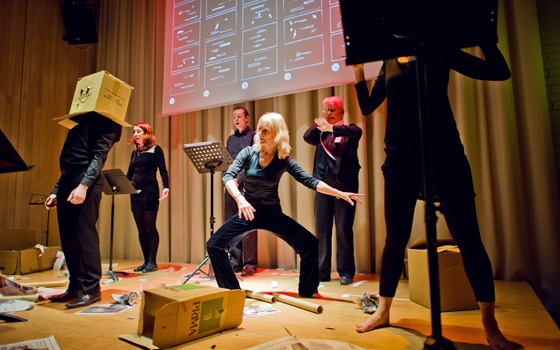
CD Launch Party: Walking Still
Wednesday, September 10, 2014 at 5:30pm
Davison Art Center
FREE!
Celebrate the release of the album Walking Still by the London-based choral group Vocal Constructivists, directed by Wesleyan Associate Professor of Music Jane Alden.
The CD launch party will include some remarks by composers, recorded performance, projections of the visual scores, conversation, and drinks from 5:30pm to 7pm. To attend the party, please RVSP to Sandra Brough by Friday, September 5, 2014.
The members of the Vocal Constructivists come from a variety of musical backgrounds and draw on classical, global, avant-garde, and performance art traditions. The group liberates experimental music from the strait-jacket of an expected sound world. Their inventive realisations make open scores accessible to established and new audiences alike. Their sound palette ranges from the English choral tradition to the extended vocal techniques of European modernism, John Cage, and the Scratch Orchestra. The familiar is reimagined and the unfamiliar given a framework for comprehension.
Formed in 2011, the group made their United States debut at Wesleyan in April 2013 during the festival-conference Time Stands Still: Notation in Musical Practice, where they were the ensemble-in-residence, and performed the world premiere of Michael Parsons' Nevrazumitelny (2013) based on a poem by Wendy Mulford, and the U.S. premiere of Wesleyan University Professor of Music Ronald Kuivila's A City of No Allusions (2012) with text taken from an interview with Morton Feldman. Both of those works were written for the Vocal Constructivists. The group also performed works by other attending composers, including Mark Applebaum's Medium (2008), and Pauline Oliveros' Sound Patterns (1961), which is the only work on the Walking Still album that had previously been recorded, in 1967.
The setting of Mr. Parsons' Nevrazumitelny for voices and percussion sounds (made using stones) selects words from Ms. Mulford’s poem and also uses phonetic transformations derived from the text.
Mr. Kuivila's A City of No Allusions focuses on interference patterns in the overtones of softly singing voices. Singers move through the circle of fifths at various rates, in order to create a sense of harmonic suspension within which to focus on the activity of the overtones.
Mark Applebaum’s Medium is a musical work for any four instrumentalists or vocalists. The score consists of a number of separate leaves—pages hand-drawn, using pens, drafting templates, French curves, and straight edges. There are several mediums at play: the work is multi-media (moving between visual art and music); the score is a medium, presenting a conceptual substance through which the expressive energy of musicians must pass; and, as a non-standard notation presented to imaginative, inventive performers, it is as much a musical filter as a musical prescription. And lastly, the work represents a middle state between spatial right and left, between the ceremony of performance and the routine of not performance.
The Walking Still album also offers the first choral recording of Cornelius Cardew’s Treatise (1963–67). The Vocal Constructivists gave the first ever sung performance of Treatise in the South London Gallery in September 2011. The group's passionate and imaginative rendering demonstrates the flexibility of this most iconic of graphic scores, which provides no key to decipher the notation, requiring musicians to devise their own methods and means of interpretation. Precise pitches, rhythms, tempi, registration, style, and instrumentation are all left for the performers to decide. Among the many influences on Treatise was the Fluxus movement and its interest in everyday activities, such as walking, transposed into a performance context.
Lauren Redhead’s concerto (2011) was first performed by the Vocal Constructivists at London's Arcola Theatre in August 2013. The work invites consideration of all of the social activities and relationships connected with music, including composing and performing but also listening, moving, thinking, and discussing—what Christopher Small calls "musicking."
In addition to chairing the Music Department at Wesleyan, Jane Alden is an Associate Professor of Medieval Studies, and is also a Fellow of the Institute for Musical Research, University of London. Her research and publications address manuscript production, patronage, reception history, musical notation, and visual culture in the medieval and modern eras. She is currently writing a book on the Scratch Orchestra and participatory music-making in London. Ms. Alden is active as a singer and conductor, seeing performance as the most effective way to reach out beyond academia to communicate with a wider public.